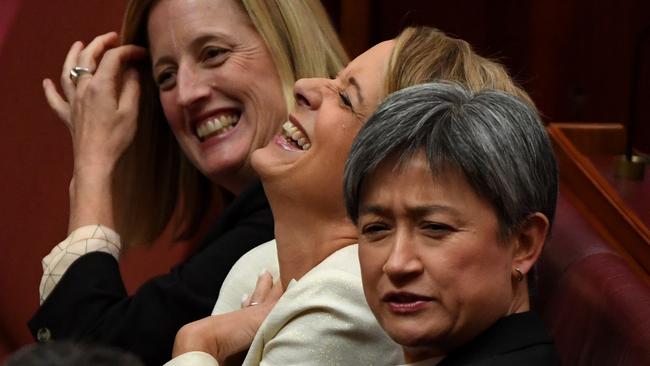Samantha Maiden: There’s been a real failure in the duty of care to Senator Kitching and to her colleagues
Nobody can know what contributed to Senator Kimberley Kitching’s death, but it would be a greater tragedy if Labor failed to reflect, writes Samantha Maiden.
Opinion
Don't miss out on the headlines from Opinion. Followed categories will be added to My News.
The death of Labor Senator Kimberley Kitching has unleashed a torrent of ugly allegations that she was the target of “mean girls” in the Senate, ostracised and isolated by Labor Senate leader Penny Wong and others.
In the midst of a power struggle over her preselection, the Victorian senator died from a suspected heart attack last week, after calling her husband from her car. An ambulance arrived but was unable to revive her.
What unfolded in the hours after was a scene of horror, as her husband Andrew and former Labor leader Bill Shorten waited with her for the undertaker to arrive.
There was grief but also anger. She spent her final months consumed with stress about a preselection threat, and isolated in Canberra.
The claims include suggestions she was kicked off ALP’s tactics committee for spurious reasons, accused of disloyalty and denied procedural fairness, denied questions in the Senate, and refused funding to collect an international award for her human-rights work.
It was this grief and anger that informed Bill Shorten’s tearful interviews less than 24 hours after her death where he put on the record the pressure she was under.
Labor leader Anthony Albanese, who said that the ALP was grieving Senator Kitching’s shock death, was quick to dismiss the use of the term “mean girls” to describe the conduct of others.

“I find it astonishing that in 2022, I get a question using the term ‘mean girls’,’’ he said.
“I find that extraordinarily disrespectful to describe strong, articulate, principled women like Penny Wong, Katy Gallagher and Kristina Keneally.
“The Labor Party family is mourning Kimberley Kitching’s loss. It was a tragic loss.
“Her funeral isn’t till Monday. Can people be a bit respectful at this point in time?”
It’s an understandable sentiment. As always, there’s also history. It was Albanese who questioned Senator Kitching’s preselection before she entered parliament and always kept a careful eye on her, given how closely she was tied to his leadership predecessor.
But in the interests of truthfulness, the term “mean girls” is not a term coined by the media. It was a term used by the late Senator Kitching to describe the treatment that she believed was being dished out to her.
It’s a confronting term and yet the term was hers.
In the interests of full disclosure, I should state from the outset that Senator Kitching was a politician that I spoke to regularly, both before she entered parliament and after she became a senator.
I’ve also known Senator Wong for more than 30 years. I like her and admire her also.
In the preparation of writing about this issue I spoke to her family and friends. This is relevant because there’s a good deal of commentary, including from the Labor leader, that it is not proper to discuss these matters out of respect to her loved ones.
The truth is that they want these matters discussed because they watched how stressed and worried she was. This is a confronting moment for the Labor Party.
As Senator Wong said Wednesday, “there is politics and there is humanity”. Even if she wanted to deny the claims, she is in an invidious position given the funeral is on Monday.
But one of the most troubling aspects of this moment is the suggestion that Senator Kitching’s claims she was being ostracised cannot be discussed or should not be reflected upon.

There’s been a real failure in the duty of care to Senator Kitching and to her colleagues. For whatever reason, there’s been no email to MPs and staff offering mental-health support to process their grief.
Like a bad marriage, or a dispute in any other workplace, it’s difficult to avoid the conclusion that these disagreements were allowed to fester.
Even now, as Victorian Senator Kim Carr awaits his own fate, nobody has bothered to pick up the phone and tell him he will be dumped. Or offer him the opportunity to resign with dignity after years of service.
That’s not to say that Senator Kitching did not play politics hard herself.
She did, and as her friends and family have said, she was not a “wilting flower” who accepted her fate with silence. In fact, she took her complaints to deputy Labor leader Richard Marles. The matter was unresolved at the time of her death.
Contrast what he said last year when claims emerged over the sexual harassment of female staffers by men in the Labor Party.
Marles warned that Labor needed to get its house in order and address these “appalling allegations.”

“Labor can’t duck away from this in the sense of pointing the finger anywhere else,’’ he said.
“This is our house, which we need to get in order, and these really are appalling allegations.”
And yet now, the same people are suggesting this should not be discussed. That it is unseemly. Or that it is sexist to discuss it.
Perhaps, if an investigation is not to be held, if the matter is not to be discussed, it should serve as a wake-up call to everyone in politics.
After the death by suicide of Greg Wilton more than 20 years ago, it was Albanese himself who said that lessons needed to be learnt.
“I made a decision as did other members of parliament at that time that we would never allow a colleague to be isolated and do nothing about it,” he said.
Nobody can know what contribution the stresses that Senator Kitching were under had to her premature death. It would be wrong to draw any direct link.
But it would be a greater tragedy if the Labor Party did not reflect on its own conduct.





